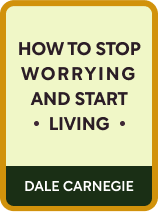

This article is an excerpt from the Shortform book guide to "How to Stop Worrying and Start Living" by Dale Carnegie. Shortform has the world's best summaries and analyses of books you should be reading.
Like this article? Sign up for a free trial here .
Do you suffer from work-related anxiety? What exact aspects of your job provoke anxious feelings?
Work-related anxiety is a common problem—to-do lists become overwhelming, dead-end jobs feel frustrating, and competition breeds insecurity. Finding a way to enjoy your work can reduce your boredom and worry and increase your energy.
Here are three actionable ways to get a handle on your work worries.
Dealing With Work-Related Anxiety
One of the most common sources of worry for many people is work. It’s important to get your worries about your work under control because work occupies a huge part of your life. Naturally, worry about work starts to touch aspects of your life outside work such as your hobbies, your relationships, and so on. There are three ways to reduce work-related anxiety:
- Search for ways to enjoy the job you do have
- Seek out and pursue work you genuinely enjoy
- Establish good, healthy working habits.
1) Search for Ways to Enjoy Your Work
One significant way that work can contribute to your fatigue and worry is boredom. It does this in two ways:
- Physically: Boredom slows down your body by decreasing your blood pressure and oxygen consumption. This leaves you feeling sluggish.
- Mentally: Boredom makes you feel resentment and frustration toward your work—negative emotions that quickly drain your mental energy. And, when you’re bored your thoughts more easily wander, meaning you spend more time ruminating on your worries.
On the other hand, when you’re interested in what you’re doing your metabolism picks up and you get a boost of mental stimulation, making you feel physically energized. This is why your energy suddenly picks up when a friend invites you out for a night of drinks and dancing even though you were just pinching yourself to stay awake at the end of the workday.
Besides simply making you less mentally and physically tired, reducing your boredom at work creates significant benefits in both your working life and your home life.
- It enhances your overall happiness. You spend a huge percentage of your life at work, so, naturally, happiness at work will equate to happiness in your life.
- Being interested and invested in your work can give you a competitive edge because you’ll work more hours and seek out learning opportunities. This can lead to promotions or better pay.
- When you aren’t fatigued at the end of the day, you get more enjoyment out of your “me” time after work.
To reap these benefits, you’ll have to find ways to enjoy your work and feel energized by it—even if you don’t particularly like your job. There are four ways you can do this.
Method #1: Make Your Work Interesting
Try to add some interest, purpose, or challenge to your work by making small goals or games for yourself, or taking on extra projects that are more interesting than your regular work.
- For example, one stenographer was bored with her job filling in oil lease forms. To make her job more interesting, she created a competition with herself—each afternoon, she tried to complete more forms than she’d completed during the morning. This added a bit of mental stimulation to her job and she became the quickest stenographer in her division.
Often, you’ll find that acting like you enjoy your work leads to genuine interest—if not in the work itself, in the challenges you’ve made for yourself.
Method #2: Think of the Gains
When you enjoy your work, you work faster—this means you get everything done by the end of the day, and don’t need to spend extra time in your workplace finishing up your tasks. And, working faster or more efficiently can line you up nicely for a promotion.
- Imagine you have a relatively boring copyediting job, but you create a personal challenge to be faster and more efficient than the other copyeditors in your department. As a result, you always finish your work well ahead of deadline with no mistakes, which gets you promoted to a more interesting position as a staff writer.
Method #3: Reframe How You Think About Work
When you’re feeling resentful of your work, think about how many people would love the chance to work at your job. Reflect on how lucky you are to have a job, even if it’s not exactly the job you want right now.
Method #4: Start Your Day With a Pep Talk
Talking to yourself positively before work and reflecting on your goals helps you approach your work with a positive attitude. This daily attitude adjustment will give you increased motivation to reach your goals, and your positive thoughts will help carry you through the tougher moments of your job.
- For example, if you work in sales, you might start your morning by saying, “Today I’m going to make x number of sales and beat last month’s numbers. I know this is achievable based on last week’s sales and the feedback I’ve gotten. I’m so close, I know I can do it.”
2) Find Work You Love
While the methods of pretending to enjoy your work can reduce your frustration and worry, it’s even better to genuinely enjoy it. When you dislike your work, you spend much of your life feeling resentful and uncomfortable, as if you don’t quite fit in where you are. On the other hand, working in a job you love positively affects your life in three ways.
- Your overall happiness and energy increase, as doing something you love doesn’t really feel like work at all. You can immerse yourself in it and forget about extraneous worries.
- Enthusiasm gives you a competitive edge because you’ll willingly spend extra time mastering necessary, advantageous skills.
- Being in a job you love significantly contributes to your longevity and overall health, according to a Johns Hopkins study.
Unfortunately, many of us are tasked with figuring out what we want to do with our lives when we’re young and still aren’t sure what we’re actually interested in, so we choose the wrong line of work.
The good news is, you can always change the direction of your career. There are a few ways to figure out what you genuinely want to do for work.
- Find a vocational counselor that can help you discuss what you want to do, or invest in books about choosing a career path that suits you.
- Avoid going into a career field just because your family is urging you toward it. For example, some students go to medical school because their parents tell them to—though they’d much rather study anthropology. While your parents may have some good advice (they’ve lived longer than you, after all), you don’t necessarily need to take that advice. Remember that your decision affects you, not them.
- Avoid professions that are already saturated, unless that’s truly what you want to do. It’s very difficult to get ahead in oversaturated professions—unless you’re enthusiastic and excel in the field, you’re prone to high levels of insecurity, stress, and worry.
- Stay away from professions where the chances of “making it” are low—again, unless you’re truly talented or enthusiastic about the field. For example, breaking into the field of acting can be incredibly challenging and discouraging, unless you have “what it takes” or genuinely enjoy the field enough to put up with the necessary effort and sacrifices.
- Do thorough research before choosing a career field—you’ll be devoting a huge portion of life to your career, so it’s not a decision to take lightly. You can accomplish this by educating yourself online and asking your network if they have connections in the fields you’re considering.
- Perhaps most importantly, keep in mind that you can change your line of work at any time. No one is destined for one occupation only—there are many fields you can succeed in if you apply yourself. For example, you may have knowledge and skills that could serve you in occupations as diverse as sales, teaching, and agriculture.
(Shortform note: Read our summary of What Color Is Your Parachute? for advice on finding a career that aligns with your interests and your abilities.)
3) Establish Good Habits Around Work
Once you’ve gotten yourself into the right job, or at least are doing your best to enjoy the job that you have, you’ll have the mental space to consider ways to make your working life more organized and stress-free. There are four actions you can take toward less tiring, less stressful workdays.
Action #1: Prioritize Rest
You don’t need to grind yourself to exhaustion or work nonstop to be efficient. Rest not only repairs and energizes you, but also prevents fatigue, which can make you more susceptible to negative emotions like worry.
Taking regular moments of rest before you’re tired will make you much more efficient and sharp, and will keep your judgment clear. On the other hand, working when you’re tired leads to sloppy, inefficient work and emotionally charged judgment.
There are numerous ways you can add moments of rest to your day, depending on the structure of your work:
- Regularly take 10 minutes to close your eyes and relax—either in your office or on a short break outside.
- If you work from home, plan a 20-minute nap following lunch.
- If you’re unable to take time to rest at work, schedule a short nap into the 30 minutes after you get home.
Action #2: Relax as Much as You Can
Interestingly, most of your work-related fatigue isn’t mental fatigue, though it might feel that way. Your fatigue is more likely physical—even if you don’t work in a physically demanding job. At work, you naturally experience negative emotions, like frustration or anxiety, over the course of the day. These emotions cause near-constant physical tension, which exerts your muscles and tires you out.
There are three methods of reducing tension at work.
- Regularly check in with your body and train yourself to relax. Set an alarm to go off every hour or so. At the alarm, check in with your body and make sure you’re not using muscles unrelated to your work. For example, if your legs are tensed while you’re sitting at your desk, you’re using those muscles unnecessarily. Once you identify your points of tension, consciously think about relaxing those muscles. Keep concentrating until the muscle feels as relaxed as possible, and then move onto the next area of tension.
- Do your work in a comfortable position. Get a standing desk if that’s your preference, get a comfortable chair, or lie down if possible when you’re working.
- Perform an end-of-day check-in. Check in with yourself at the end of the day, and figure out if your energy level truly corresponds with the work you did. If you did little work that was fairly easy but you feel exhausted, you likely were tensed up for much of the day. If you feel alert at the end of the day and it corresponds with the amount of work you did, you likely did a good job mastering unnecessary tension.
Action #3: Establish Good Working Habits
There are four habits that are crucial to an organized, uncluttered workday that won’t drain your mental energy.
Working Habit #1: Clear Your Desk
It’s difficult to tackle your problems calmly and efficiently when your desk is crowded with reminders of everything you need to get done. Remove everything from your desk, except for whatever needs your immediate attention. This lets you focus on one problem at a time, instead of trying to navigate the tension between what needs to be done now and what’s creating anxiety on the horizon.
- For example, if you need to spend an hour answering emails, clear your desk of everything except your laptop, and close all browser windows except for your email.
This concept also applies to your thoughts. Don’t hold problems and issues in the back of your mind, resolving to deal with them “later.” This clutters your mind with tense thoughts of everything that needs to be completed. Instead, deal with issues, questions, and problems as soon as they come up. In your workday, this can look like:
- Answering questions right away, or immediately starting the process of finding an answer
- Dedicating a part of your morning and afternoon to checking your emails and responding right away, instead of letting your responses linger in your draft folder
- Scheduling meetings as soon as you think of them
- Making a note of issues that you can’t deal with immediately
Working Habit #2: Prioritize
Two abilities that are crucial to good, efficient work are clear thinking and knowing how to prioritize your tasks. This means thinking ahead about your day and the importance of each task you must complete, and scheduling your day so that you can work through your obligations in the order of their importance.
- For example, you might dedicate your mornings to important meetings, and save newsletter drafting or small copy editing tasks until the end of the day.
A good way to make sure your day’s tasks happen in the order of their importance is to plan and write down your schedule ahead of time—you might do this the night before, choosing to include your morning routine in the schedule, or wake up early and think about how you’ll tackle the day over a cup of coffee.
Working Habit #3: Come to a Decision ASAP
Don’t delay decisions for fear of pulling the trigger—when you have enough information about an idea or a proposed action, make a decision right away. This “decision” can take several forms:
- A decision to execute the idea
- A decision to get more information before further discussing the idea
- A decision to prioritize a different action or idea first, before returning to this one
- A decision that in the end, nothing needs to be done
Prioritizing clear decision-making, instead of allowing hemming and hawing over possible actions and outcomes, quickly clears your to-do list—which alleviates stress for everyone.
- For example, the directors of US Steel used to have board meetings where they discussed problems at length–but never made decisions. As a result, they never cleared issues off their plate and let their to-do pile grow exponentially—which caused immense stress and worry for the employees who had to deal with all the loose ends. Finally, a board member suggested that they discuss only one problem per meeting, and come to a decision—be it to execute on an idea, collect more information, or something else—before moving onto the next issue. This started productive action toward issue resolution, which diminished the to-do pile. Employees no longer had to spend overtime thinking about unresolved issues and were relieved of the overarching tension caused by a mountain of problems.
Working Habit #4: Learn to Delegate Work
If you don’t learn to delegate work to others and trust them to get it done, you’ll end up trying to do everything yourself. This overworks you, making you feel stressed out, resentful, and overwhelmed.
(Shortform note: Our summary of Dare to Lead suggests tips for working through your reluctance to delegate work. For example, try delegating small, easy tasks to others. Once you see proof that others can accomplish the duties you give them, you can start giving larger and more important tasks.)
Action #4: Stop Fretting About Your Sleep Schedule
Many people deal with sleeping problems—work-related and otherwise—at some point in their lives. Insomnia is unpleasant as is, and its effects are compounded when you start worrying about how it’s affecting you and your work.
When you get caught up worrying about your insomnia, there are two ways you can help keep the worries at bay. First, you can take your sleeplessness as a sort of blessing—use the time that you’d ordinarily spend in bed thinking about how you can’t sleep to dive into some work for the next day. Either you’ll eventually fall asleep, or you’ll be ahead on your work for the day. Second, keep in mind that no one has died from insomnia—and many of the health problems that come from insomnia such as a lowered immune system and anxiety are actually side effects of worrying about your insomnia.
(Shortform note: Since the 1940s, numerous studies have suggested that lack of sleep does have a negative impact on your health. However, it’s true that there haven’t yet been any reported cases of death from lack of sleep. In any case, Carnegie is correct in stating that worrying about your lack of sleep will make the effects of insomnia worse.)
There are three ways to help yourself get to sleep—without significant worry about it.
- Create a feeling of security with prayer. When we feel that a higher power is watching over us when we’re sleeping, we feel secure enough to drift off to sleep. At bedtime, try speaking to your higher power of choice to unload your anxieties and “give them away” until you wake up.
- Physically relax. Your mind can’t fully relax until your body fully relaxes. Follow the same process as relaxing in your workplace: Concentrate on one part of your body while thinking, “Relax. Let go of the tension.” Methodically work through all your muscles until you’ve consciously relaxed your full body.
- Wear yourself out. When you get tired enough, you’ll naturally have to sleep. Engage in physically exhausting activity during the day—take up a sport like biking or running, or try a physically demanding hobby like gardening or building.
(Shortform note: For more tips on streamlining and eliminating stress from your workday, read our summary of Getting Things Done.)

———End of Preview———
Like what you just read? Read the rest of the world's best book summary and analysis of Dale Carnegie's "How to Stop Worrying and Start Living" at Shortform .
Here's what you'll find in our full How to Stop Worrying and Start Living summary :
- What worry is and how it manifests both physically and mentally
- How to deal with worry about work, finances, and criticism
- How to cultivate a less worried mindset






